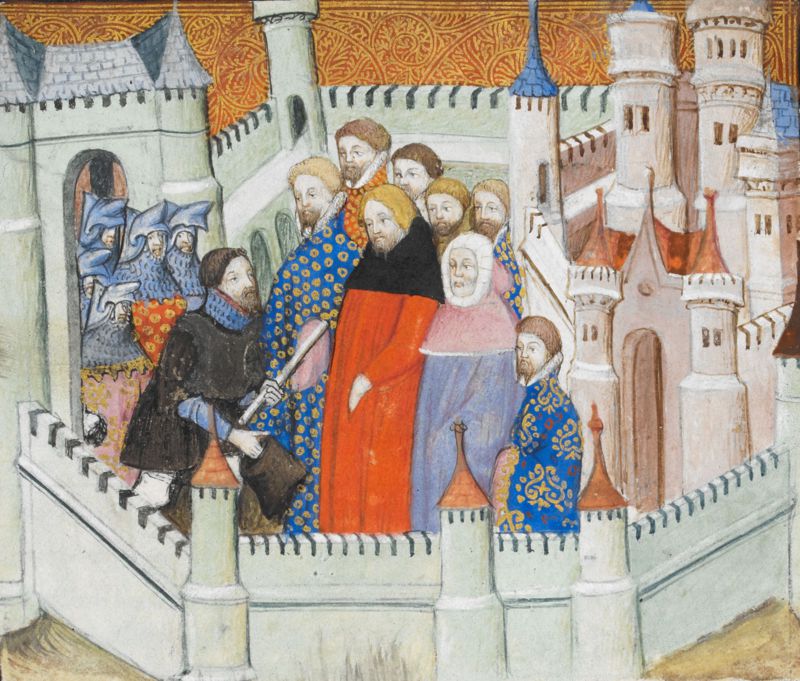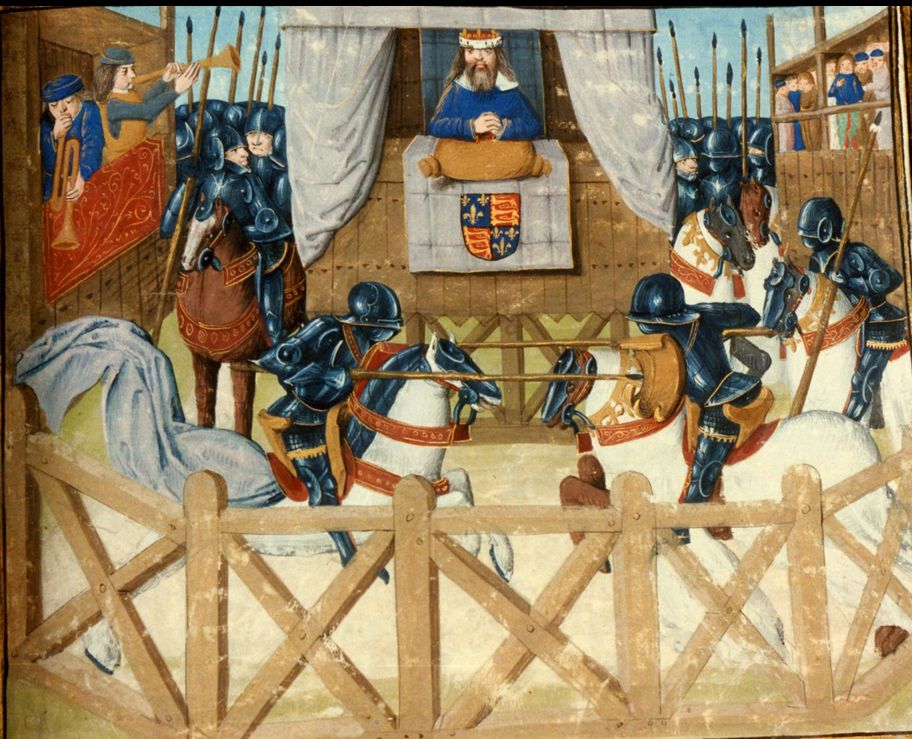
Even though Richard II and Henry Bolingbroke were first cousins and born only a few months apart, their personalities were total opposites. Whereas Richard had little interest in marshal activities and did not participate in tournaments, Henry began his training at fourteen and was a champion at jousting. Richard’s early childhood was spent mostly in his own household with a father who was slowly dying; Henry was surrounded by siblings and cousins and given a first-rate education; he could write in French, Latin, and English. Richard was crowned at age ten with all the accompanying ceremony and formalities; Henry was free to come and go as he pleased. In May of 1390, while Richard was struggling to establish his own rule after proclaiming his majority, Henry was making a name for himself at the famous Tournament at St. Inglevert in France. After that, he took a huge contingent of knights on crusade, first to Tunis, then to Lithuania—all funded by his father. Oh, and he traveled all over Europe, the honored guest of kings and dukes. In between all this traveling, Henry managed to sire six children, whereas Richard had none. Surely Richard must have envied his lifestyle!
Interestingly, a year before Edward III’s death, the king created an entail that ordered the succession along traditional male lines. This meant that John of Gaunt was the next heir to the throne, and after him, Henry Bolingbroke. Because of Gaunt’s unpopularity at the time, the entail was kept quiet; few even knew of its existence. I can only assume that Richard and Henry were among the few, and this must have impacted on their relationship. Later in life Richard vehemently opposed the idea of Henry following him, though he never formally declared an heir. Many of his countrymen, unaware of the entail, assumed that the Earl of March, descended from Edward III’s second son Lionel though his daughter, would be next in line.
Henry Bolingbroke spent much of his time away from court, although he was present with the king in the Tower during the Peasants’ Revolt. Since Henry’s father was one of the primary targets of the revolt, it made sense to leave him behind in safety while Richard ventured out to meet the rebels at Mile End. No one expected the insurgents to breach the Tower defenses and pour into the fortress, dragging out the Archbishop of Canterbury and Treasurer Hales and decapitating them on the spot. Henry surely would have met with the same fate except for the quick thinking of one John Ferrour, who managed to hide him from the intruders; they obviously didn’t know he was there.

The first major breach in Richard and Henry’s relationship came about as the Lords Appellant organized their fight against the king in 1387, leading to the Merciless Parliament. At first there were only three Appellants: the earls of Arundel and Warwick and the Duke of Gloucester (Richard’s uncle). But when they discovered that the king had sent his favorite Robert de Vere to Chester so he could bring back a royal army, Henry Bolingbroke and Thomas de Mowbray joined them. Bolingbroke personally blocked de Vere at Radcot Bridge, precipitating an easy defeat over the king’s forces. Although the new newest Appellants kept a low profile and broke ranks with their elders over the execution of Sir Simon Burley, the proverbial die was cast and Richard never forgave his cousin.
But things were complicated. Once King Richard declared his majority, he relied on his uncle to support his throne—a reliance that was well placed, for Gaunt proved his champion for the rest of his life. Naturally, this meant that Henry would be treated well; Gaunt’s protective cloak shielded him from Richard’s revenge against the senior Appellants. All might have gone well, except that Thomas de Mowbray lost his nerve and blew things wide open. He spilled his guts to Henry who told his father who told the king, and voila! Richard had the opportunity to get rid of his last two enemies. Rather than let one of them kill the other in a trial by combat, the king stopped the tournament and outlawed them both. Shakespeare gave us the perfect depiction of this pivotal event in his play Richard II.

Richard almost got away with his revenge. Had he not confiscated Henry’s inheritance after Gaunt died, perhaps his cousin would have respected his outlawry. That’s one of the big “What ifs” in medieval history. But the king went too far and precipitated his own downfall. Henry’s popularity in England and Richard’s perceived tyranny against his own people brought about an almost bloodless revolution. At some point during his return, Henry decided to go all the way and claim the crown that he was destined to inherit, according to Edward III’s entail. Valorous, handsome, chivalrous, robust, well-educated, and popular, Henry held all the advantages, and poor Richard didn’t stand a chance.